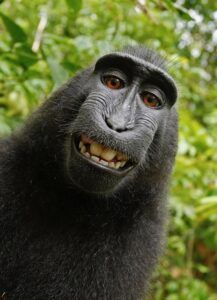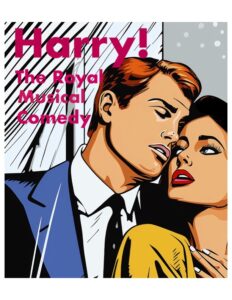Mother of Invention: A Necessary Journey into Midjourney
by Scott Sublett
I am not Mr. Technology of 2023. I’m not even Mr. Technology of 1948 because damned if I can tell you how a TV works and if you think you can do any better, sit down and write a lucid paragraph about it right now. I therefore wasn’t thrilled about tackling Midjourney, a newfangled gizmo that generates images with artificial intelligence, and makes many of the artists I know distinctly queasy. The necessity that mothered my journey into Midjourney was a planned reading of my play, “Harry! The Royal Musical Comedy.” The reason for the reading was that while British producers occasionally read manuscripts, in Manhattan, if you want producers to know your work, you have to read it to them. Fine, but actors and directors seem to think that they should be compensated for their exertions. Some writers, and all poets, find that belief astonishing. Nevertheless, the actors and director must be paid, though, admittedly, less than they deserve, and certainly as little as the writer can decently get away with. Then there’s the space to be rented, and scripts to be copied, and the upshot is that even a little table reading adds up. The thing is, one is not rich, so when I needed a graphic to “brand” the play reading, I had to make it myself. Unhappily, I can’t paint, or draw, and, in fact, I don’t think I have much of a visual sense at all. Enter Midjourney.
Like most artists, I was vaguely “against” AI-generated art while knowing nothing about it. But when I suddenly saw how AI art could benefit me personally, I suddenly became thoroughly modern and cried, “O brave new world that has such contraptions in’t!”
Just getting signed up for Midjourney was balky and counterintuitive, as are a lot of things about the site, but I watched a few YouTube videos, and by the end of the first day I’d started Midjourney. Once you’re on, the actual generation of images is pretty quick and easy. You type in a prompt, and it gives you a picture. Of course, what it gives you is not quite what you had in mind, or is completely and bizarrely not what you had in mind, and that’s the thing: a real human artist has a vision in his head and then makes it happen in the real world. Probably the artist’s vision evolves as the work is made real, but the decisions all happen in the mind of the artist. With Midjourney, you type in a prompt, which can be a word, a sentence or a long, elaborate paragraph, but what the bot gives you is not “your” vision. It’s the bot’s vision. The bot is not a mind reader. It doesn’t make your vision come to life. There lies the distinction between human art and AI art.

What it hands you often looks slick and professional, and for the purposes of, say, a small businessman putting together a brochure for his widget repair business, or a playwright making a postcard for his little play reading, it will certainly do. The other thing is, although the bot does not give you your vision, it sometimes gives you something you never would have thought of, which is what it did for me.
Coming up with something usable took about three workdays. The successful prompt (please note in reading it that I’ve been told Midjourney doesn’t care about capitalization and punctuation, so I didn’t) was this: “Prince harry in anguish, meghan markle cool and sultry, style Roy Lichtenstein, retro comic strip, orange hair on harry”.
When the image emerged the Duchess, too, had orange hair, but I could fix that, and most important—I loved the image. I never would have thought to say, “Make Harry resemble Troy Donohue making a face like a tragically lovesick teenager in a 1950s Douglas Sirk melodrama,” but that’s what I got, and the image still makes me chuckle, which is of course what you want for a comedy.
Just using “Roy Lichtenstein” in the prompt gave me nothing serviceable, but when I added “vintage comic strip,” bingo, I started seeing things. You might ask, aren’t you ripping off Roy Lichtenstein? You might also ask, wasn’t Roy Lichtenstein ripping off those vintage comic strip artists? We stand on the shoulders of those who came us before us. We synthesize within a cultural tradition. Again, it’s currently in my best interest to think that, but when a bot starts generating plays “in the style of [me],” I reserve the right to change my tune. AI is one reason the Writer’s Guild decided to strike, and they’re right to be scared. In ten years, chatbots will be writing librettos for musicals that are no worse than most of the librettos on Broadway right now (although not as good as mine). Speaking of my ego, I can’t help but feel proud of the poster that I didn’t really make. I merely composed a simple sentence and an ungrammatical one at that. Granted, I rewrote my prompt dozens and dozens of times over a three-day period, but think of the time I saved not going to art school.
Yet, yeah, some little corner of my vanity thinks, “Look at me, I’m an artist,” and that is grotesquely wrong. For one thing, legally, the picture isn’t mine. The courts will be refining their views for years to come, but up to now the dispositive legal principle has been that copyrights can only be held by humans, and that’s why a 2011 photograph taken by a macaque monkey is in the public domain. PETA sided with the monkey. It’s also why the first-place picture from last year’s Colorado State Fair, Matthew Allen’s Théâtre D’opéra Spatial, made in Midjourney, was denied copyright protection despite having been considerably altered with Adobe Photoshop and Gigapixel AI. Allen specified that making the picture had required at least 624 text prompts and input revisions. One supposes maybe the prompts could be copyrighted, but that does no good because someone using identical prompts would wind up with something completely different. The machine is doing the deciding and decides differently every time. The US Copyright Office cited Midjourney’s “unpredictability” when artist Kris Kashtanova was granted limited copyright protection for her graphic novel “Zarya of the Dawn,” but no protection whatsoever for the individual Midjourney images within it. Of course, photographers select images that appear randomly in the world, crop them, fiddle with them in Photoshop, and rightly call them art—and copyright them.
If you can’t copyright the work, how do you monetize it? Which is why someday a smart lawyer will figure out a way to copyright AI images. One potential rationale could be that if the artist alters what Midjourney emits, he could cite the fair use doctrine, which allows limited use of copyrighted material that has been sufficiently transformed—whatever “sufficiently” means. Or, if I pay the AI company to use their bot, well, the bot works for me, so isn’t what the bot does copyrightable by me as a “work for hire”?
What’s indisputable is that playing with this stuff can inform other aspects of one’s art. I’ve read that novelists ask Midjourney to envision locations that they then describe in prose. As for me, in creating a graphic for another of my plays, a Midjourney image inspired a title I liked better than the one I had. I’m using the new title, but so can you. Like art made in Midjourney, titles can’t be copyrighted.

But is it art? “Artists make art, creatives make images in AI,” said a sculptor who has exhibited in museums, but who shall remain nameless because the remark was made in private. Then again, Marshall McLuhan famously said, “Art is anything you can get away with.” (Andy Warhol said it again later and in brighter colors.) A friend whom I asked to edit this essay submitted an earlier draft to ChatGPT, which instantly delivered a critique so spooky good and useful that I felt a deathly chill. “G,” as my friend calls his “new best friend,” liked my “humorous voice” (so did Mom!) but the chatbot felt the piece would be better with an “Enhanced Discussion on AI Ethics: While the article touches on copyright implications, it might benefit from a deeper exploration of the ethical implications of AI in art. Does using AI diminish the value of human creativity? Or does it expand the possibilities?” I don’t know. “G” also said my ending was weak. Is this any better? I’m human. I’m messy. I’m done.
